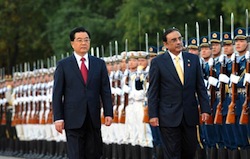China-Pakistan Nuclear Deal Poses Nonproliferation Challenges
June 7, 2010
Featured Image
Today's top nuclear policy stories, with excerpts in bullet form.
Stories we're following today, Monday, June 7, 2010:
The Breach - Mark Hibbs for Foreign Policy [link]
- In the coming weeks, China is expected to announce that it intends to export two nuclear-power reactors to Pakistan. The move would breach international protocol about the trade of nuclear equipment and material.
- Once the deal is officially confirmed, the spotlight won't be on either Beijing or Islamabad; it will be on Washington, which concluded a watershed nuclear agreement with India in 2008.
- That deal is the precedent that has opened the door for China -- creating an awkward test for a U.S. administration greatly concerned about the risks of nuclear proliferation.
- China's announcement will overstep the guidelines of the 46-country Nuclear Suppliers Group (NSG), which bar nuclear commerce between Nuclear Non-Proliferation Treaty (NPT) members like China and nonmember states like Pakistan. It will leave U.S. President Barack Obama with two options: He can either oppose the transaction and request that China leave the NSG, or grudgingly accept the Chinese exports.
- NSG members should push hard to ensure that significant nonproliferation benefits accrue from the China-Pakistan deal.
Obama's Agenda, Israel's Ambitions Often at Odds [link]
- Since its creation more than six decades ago, the state of Israel has been at times a vexing ally to the United States.
- But it poses a special challenge for President Obama, whose foreign policy emphasizes the importance of international rules and organizations that successive Israeli governments have clashed with and often ignored.
- Israel has a unique set of security threats and national ambitions that have fostered policies inconsistent with Obama's broader agenda, including his push to stop the spread of nuclear weapons and repair U.S. relations with the Islamic world.
- That has forced him to carve out exceptions for Israel that undermine the consistency he seeks in dealing with allies and antagonists alike.
- "You have Israel feeling that it stands apart because it faces challenges unlike anyone else. And you have an administration that wants to establish a rule-bound international order. The question is how effectively do they juggle the two, and the test of that will be whether they achieve their policy," said Robert Malley, a former Middle East adviser to Clinton.
The Real Winner of the Flotilla Raid - NIAC INsight Blog [link]
- Israel’s attack on the aid flotilla headed toward Gaza has sparked international outrage. But it also reminds us that since 2001, Iran has improved its geostrategic position more than almost any other country in the world, and it has done so based almost entirely on the blunders of others.
- In a meeting Tuesday between US Secretary of State Hillary Clinton and Turkish Foreign Minister Ahmet Davutoglu, the topic of discussion was supposed to be imposing a new round of sanctions on Iran. But instead, the flotilla incident dominated.
- Better than anything Iran could have hoped for, the flotilla incident threatens to complicate the sanctions push in the UN. Washington Turkey expert Soner Cagaptay predicts that where Turkey would have likely abstained on an Iran sanctions vote, it may now vote nay.
- Will Washington placate a vital strategic ally like Turkey, or will it continue its unconditional support for all Israeli action? Appeasing one will come at the expense of damaged relations with the other, and no matter the outcome, it doesn’t make for a very good Iran policy.
Gates Prods China on NKorea, Military Ties to US - The Associated Press
- U.S. Defense Secretary Robert Gates challenged China to deal realistically with the short-term question of how to respond to an antagonistic North Korea.
- "As long as the [North's] regime doesn't care what the outside world thinks of it, as long as it doesn't care about the well-being of its people, there's not a lot you can do about it, to be quite frank, unless you're willing at some point to use military force. And nobody wants to do that," Gates said.
- In a tense exchange following his address to the conference, Gates dismissed suggestions by a Chinese general that Washington was being hypocritical in criticizing North Korea but not Israel for its commando raid on an aid flotilla in the Mediterranean Sea this past week.
- "There is a wide gap in the U.S. attitude and policy to the two instances," said Maj. Gen. Zhu Chenghu of China's National Defense University.
Feeling Lucky, Rogue? - David Hoffman in Foreign Policy [link]
- In a world without nuclear weapons, wouldn’t the rogue be king? And if there were international controls in such a world, would it be hard to detect the bad guys building a bomb?
- One way to find out: be the bad guy yourself. The Henry L. Stimson Center has just put together an online simulation that allows the user to play rogue state decision-maker in the year 2040, navigating the pathways to building a bomb without getting caught. It’s called Cheater’s Risk.
- The underlying argument of Cheater’s Risk is that, in the event of disarmament, cheating on a treaty “is not a piece of cake,” in the words of Barry M. Blechman, co-founder of Stimson,
- NOTE: The Stimson Center is a Ploughshares Fund grantee.



